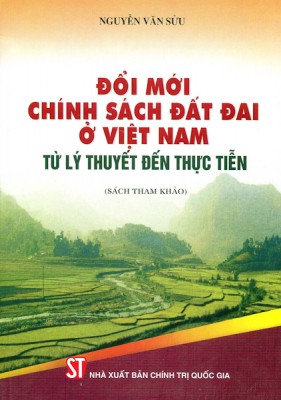USSH is pleased to introduce the new book "Land Policy Innovation in Vietnam - From Theory to Practice" by author Nguyen Van Suu (PhD, Deputy Head of the Department of Anthropology). The book consists of 5 chapters, 258 pages, and is published by the National Political Publishing House.
Publisher's Note
In recent years, land issues and land policy reform in Vietnam have become a hot topic, sparking lively discussions in public opinion. It is not just a matter for one sector or level of government, or for land policy makers; more importantly, it is a daily issue directly related to the rights and livelihoods of many individuals, families, and social strata. Because of its significance and importance, land has become a crucial and fascinating topic, attracting the attention of many scholars and researchers from various scientific fields.

To date, dozens of books and hundreds of research papers have addressed the issue of land and the process of land policy reform in Vietnam. Regardless of the approach, most studies agree on two points: firstly, land has economic value and political significance for social entities and the State; and secondly, land policy reform in Vietnam since the 1980s has created a significant transformation in the structure and relations of land, contributing greatly to economic recovery and growth, and ushering in a period of liberalization and commercialization in many sectors in rural Vietnam. However, these works have not yet thoroughly and systematically analyzed and evaluated the context, causes, content, consequences, and impacts of land policy reform on the economic, political, and social spheres. This reality presents numerous issues and challenges for researchers and land policy makers in Vietnam. The question is: how can we obtain more effective research and solutions to address the demands of reality, while simultaneously predicting the trends and impacts of future land policy reforms, thereby formulating a sound socio-economic development strategy appropriate to Vietnam's circumstances and realities? From this insightful perspective, after many years of reflection and deliberation, Dr. Nguyen Van Suu has published the book "Land Policy Reform in Vietnam - From Theory to Practice". By combining various approaches, this book analyzes the process of land policy reform in general, and agricultural land in particular, which began in the 1980s. It examines its impact on several areas such as ownership, management, property rights, access to and use of land, land use rights reclamation, and the transformation of farmers' livelihoods. Through this analysis, the book explores changes in land structure and relations; the relationship between land policy planning, implementation, and reform in Vietnam; and the economic, political, and social impacts of this process on farmers in particular and social life in general. The author also points out the existing gap between theory and practice, policy and implementation, in land policy planning and implementation, especially for agricultural land. These issues are and will continue to be the driving force and cause of adjustments and reforms to land policies in the coming years. This book is a valuable and useful reference for researchers, land policy makers, and a wide readership. The publisher and author welcome reader feedback to further improve future editions. We respectfully introduce this book to our readers.
Comments from some reviewers
“[…] This is a research work of very high theoretical and practical significance, contributing to the evaluation of policies issued on land, especially agricultural land in Vietnam… A multi-dimensional, objective approach… The source materials are very rich, making maximum use of existing sources on the research issue, from archival sources to ethnographic fieldwork and published materials in various forms… In short, this is a meticulous, vivid, and serious research work… a very good reference for the field of land research and agricultural history. […]” “[…] The author's approach and presentation style in this research evoke a fresh feeling, truly attracting the reader… The research content is analyzed and evaluated from multi-faceted information from Vietnamese and foreign scholars, with different, even contradictory, viewpoints. Thanks to this, the content is presented more objectively and scientifically, compelling the reader to engage.” It is also necessary to analyze and evaluate the issue from one's own perspective… This is a meticulous and serious research project with many new contributions to science. […]” “[…] The author has clearly analyzed the views of scientists when addressing the issue of land in Vietnam today. The author's approach to framing and solving the problem is not limited by prejudices but reflects his independent viewpoint… The author's argumentation and presentation are logical, rigorous, and approach the issue from an interdisciplinary/multidisciplinary scientific perspective, making it engaging and persuasive. This is a meticulous and serious research project of high scientific quality. […]” “[…] The author of the book shows that there is currently a certain gap between theory and practice, policy and implementation in the planning and implementation of land policies, especially with agricultural land. These issues are and will be the driving force and cause of adjustments and innovations in land policies in the coming years. […]”Structure
Besides the introduction and conclusion, the book consists of 5 chapters and 258 pages. Chapter 1 analyzes the process of land policy reform in Vietnam, Chapter 2 discusses the issue of property rights over land use rights. Land management irregularities, disparities in access to land use rights, and the issue of livelihood transformation for farmers whose agricultural land use rights have been confiscated are analyzed, discussed, and explained in Chapters 3, 4, and 5.

